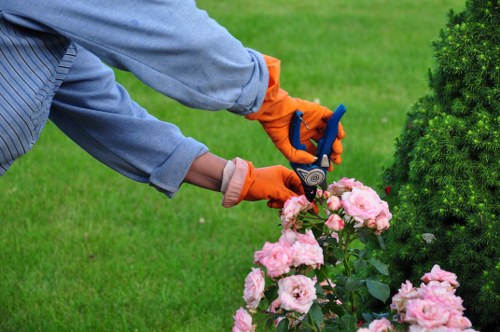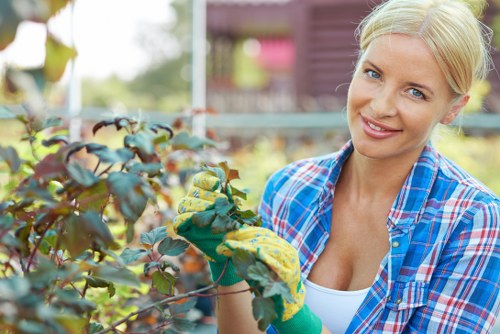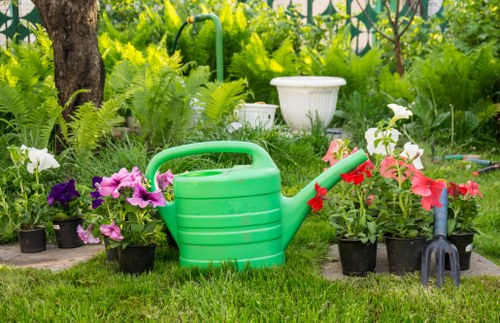Garden Maintenance in Herne Hill

Maintaining a beautiful garden in Herne Hill requires dedication, knowledge, and the right set of tools. Whether you're a seasoned gardener or a novice, understanding the local climate, soil conditions, and plant varieties is essential for creating a thriving outdoor space.
Herne Hill's unique environment presents both opportunities and challenges for gardeners. The area experiences a temperate climate with distinct seasons, which means different maintenance tasks throughout the year. From spring planting to winter protection, each season demands specific care to ensure your garden remains lush and vibrant.
One of the first steps in effective garden maintenance is soil preparation. Healthy soil is the foundation of a successful garden, providing essential nutrients and supporting strong root systems. Regular soil testing can help determine pH levels and nutrient deficiencies, allowing gardeners to make informed decisions about amendments and fertilizers.

Seasonal Garden Care
Understanding the seasonal requirements of your garden is crucial for maintaining its health and appearance. Each season brings its own set of tasks and considerations:
Spring Maintenance
Spring is a time of renewal, making it the perfect season for planting new flowers and vegetables. Start by clearing away any debris from the winter months and pruning dead or damaged branches. Fertilizing the soil can also give your plants the boost they need to thrive during the warmer months.
Summer Maintenance
During the summer, the focus shifts to watering and pest control. Consistent watering ensures that plants remain hydrated, especially during heatwaves. Implementing drip irrigation systems can help conserve water while keeping your garden adequately moist. Additionally, keep an eye out for pests and diseases, addressing any issues promptly to prevent widespread damage.
Autumn Maintenance
Autumn is the ideal time for planting perennials and preparing your garden for the colder months. Rake fallen leaves to prevent mold and mulch beds to protect roots from frost. This season is also perfect for dividing overgrown plants and planting bulbs for spring blooms.

Winter Maintenance
Winter may seem like a dormant period for gardens, but proper maintenance can set the stage for a successful spring. Protect sensitive plants with covers or mulch, and ensure that pathways are clear of snow and ice to prevent damage to your garden structures.
It's also a good time to review your garden design. Assess what worked well in the past year and what could be improved. Planning ahead can help you make informed decisions when the growing season returns.
By staying on top of seasonal tasks, you can maintain a healthy and attractive garden all year round in Herne Hill.

Choosing the Right Plants for Herne Hill Gardens
Selecting plants that thrive in Herne Hill's climate is essential for minimizing maintenance efforts and ensuring a vibrant garden. Consider the following factors when choosing plants:
- Climate Compatibility: Opt for plants that are well-suited to the local temperature ranges and precipitation patterns.
- Soil Type: Understand your garden's soil composition and choose plants that prefer similar conditions.
- Light Requirements: Ensure that plants receive the appropriate amount of sunlight, whether they thrive in full sun, partial shade, or full shade.
- Hardiness: Select hardy varieties that can withstand Herne Hill's winters and summers.
Native plants are often a great choice as they are adapted to the local environment and require less maintenance. Additionally, incorporating a mix of annuals and perennials can provide continuous color and interest throughout the growing season.

Lawn Care and Management
A well-maintained lawn is a cornerstone of any garden. Proper lawn care involves regular mowing, watering, and fertilizing. Here are some tips to keep your lawn healthy:
- Mowing: Keep your grass at an optimal height to encourage deep root growth and prevent weeds.
- Watering: Water deeply and infrequently to promote drought resistance and minimize water waste.
- Fertilizing: Apply fertilizer during the growing season to provide essential nutrients.
- Weed Control: Regularly remove weeds by hand or use appropriate herbicides to maintain a clean lawn.
Additionally, aerating your lawn can improve soil structure and increase the availability of nutrients and water to the roots.

Pruning and Trimming Techniques
Pruning and trimming are vital for the health and aesthetics of your garden plants. Proper techniques ensure that plants grow vigorously and maintain their shape:
- Identify the Right Time: Most plants have specific seasons for pruning, typically late winter or early spring.
- Use the Right Tools: Sharp, clean tools prevent damage and reduce the risk of disease transmission.
- Remove Dead or Diseased Wood: This promotes healthy growth and prevents the spread of pests.
- Shape Plants: Trim overgrown branches to maintain a desirable shape and size.
Regular pruning also encourages better air circulation and sunlight penetration, which are essential for plant health.

Pest and Disease Control
Protecting your garden from pests and diseases is crucial for maintaining plant health. Here are some strategies to manage common issues:
Integrated Pest Management (IPM)
IPM combines biological, cultural, physical, and chemical tools to manage pests with minimal environmental impact. Start by identifying the pests and understanding their life cycles, then implement targeted control measures.
Natural Remedies
Encourage beneficial insects like ladybugs and lacewings that prey on common garden pests. Additionally, using neem oil or insecticidal soaps can effectively manage infestations without harming the ecosystem.
Disease Prevention
Prevent diseases by selecting disease-resistant plant varieties, practicing crop rotation, and ensuring proper spacing for adequate air circulation. Removing and disposing of infected plant material promptly can also help prevent the spread of pathogens.

Sustainable Garden Practices
Adopting sustainable practices in your garden not only benefits the environment but also promotes long-term garden health:
- Composting: Recycle garden waste into rich compost to enhance soil fertility.
- Rainwater Harvesting: Collect rainwater for irrigation to conserve water resources.
- Native Planting: Use native species that require less water and are more resistant to local pests.
- Organic Gardening: Avoid synthetic chemicals and opt for organic fertilizers and pest control methods.
Implementing these practices can lead to a more resilient and eco-friendly garden.

Hiring Professional Garden Maintenance Services
While DIY garden maintenance is rewarding, there are times when professional assistance can make a significant difference. Professional garden maintenance services in Herne Hill offer expertise and equipment that can enhance your garden's appearance and health:
- Expert Knowledge: Professionals understand local plant varieties and best practices for maintenance.
- Time-Saving: Hiring experts allows you to focus on other aspects of your life while ensuring your garden is well-maintained.
- Comprehensive Services: From planting and pruning to pest control and lawn care, professionals can handle a wide range of tasks.
Consider consulting with a local garden maintenance service to discuss your garden's specific needs and develop a tailored maintenance plan.

DIY Garden Maintenance Tips
For those who prefer a hands-on approach, here are some DIY garden maintenance tips to keep your Herne Hill garden in top shape:
- Regular Weeding: Consistently remove weeds to prevent them from competing with your plants for nutrients and water.
- Mulching: Apply mulch to retain soil moisture, suppress weeds, and regulate soil temperature.
- Pruning: Keep plants healthy and shaped by regularly pruning and trimming as needed.
- Soil Enrichment: Add compost or organic matter to improve soil structure and fertility.
- Water Management: Ensure your garden receives adequate water through proper irrigation techniques.
By incorporating these practices into your routine, you can maintain a beautiful and healthy garden with minimal effort.

Conclusion
Effective garden maintenance in Herne Hill requires a combination of knowledge, effort, and the right strategies. By understanding the seasonal needs, selecting appropriate plants, and implementing sustainable practices, you can create a thriving garden that enhances your home's beauty and provides a peaceful outdoor retreat.
Whether you choose to manage your garden yourself or enlist the help of professionals, consistent care and attention are key to achieving and maintaining a stunning garden in Herne Hill.
Contact us today to learn more about our garden maintenance services and how we can help you achieve the garden of your dreams.
